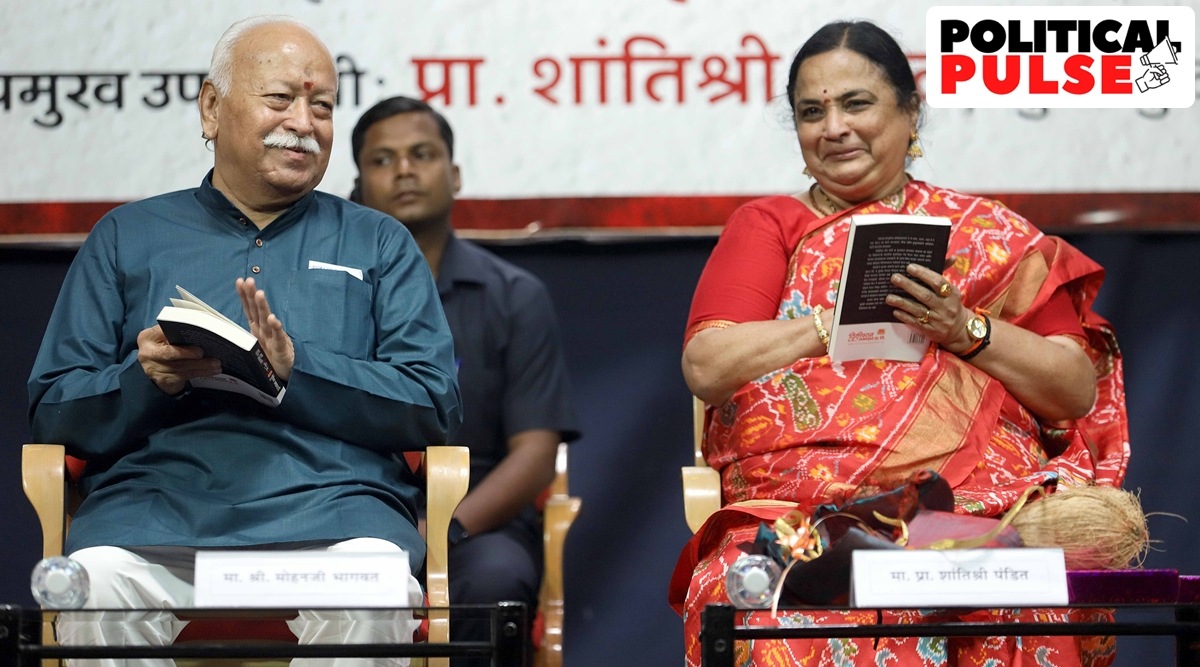Book launches, interviews, film wing, PR agency: How RSS is reaching out to shed ‘majoritarian’ image
In an acknowledgment of the view of Sangh through “only Hindu-Muslim prism”, RSS is trying to document its social work. “Sangh is far more than what headlines may suggest”.
 RSS chief Mohan Bhagwat and JNU V-C Santishree Dhulipudi Pandit during a book launch ceremony in Pune. (Express file photo by Pavan Khengre)
RSS chief Mohan Bhagwat and JNU V-C Santishree Dhulipudi Pandit during a book launch ceremony in Pune. (Express file photo by Pavan Khengre) Addressing a gathering in Delhi in May this year, Environment Minister Bhupendra Yadav said that the Sangh Parivar was often seen through the prism of “majoritarianism”, adding that this was not only untrue but also ignored “the tremendous social work” it did on the ground.
“We work to bring society together… The thoughts of Lord Buddha and ideas of the Sangh are the same,” Yadav said.
The statement was a quiet acknowledgment that the RSS had failed to convey a complete picture to the people of its worldview.
But if one reason for this has been the RSS’s lack of engagement with the mass media, it has gone about changing this in the past few years, through a structured programme to document its social work.
Traditionally known to be “shy” – often “suspicious” – of the media, the Sangh now actively shares information about its daily work and even internal workings, its top leaders going the extra mile to interact with journalists, and keeping its programmes open to all.
In an interview to RSS-linked magazines Panchajanya and Organiser in January, RSS chief Mohan Bhagwat talked about the Sangh not avoiding the media anymore as it was a mainstream force. “… even though we do not want to go to the media on many issues, we cannot avoid doing so. This may be counterproductive. They might wonder why we are hiding in the shadows. We have to face the media,” he said, while cautioning against “craving for publicity”.
One of the first signs of this change was in 2016, when current RSS general secretary Dattatreya Hosabale participated in the India Today Conclave. Top Sangh leaders traditionally avoided corporate-sponsored media events.
In 2017, Hosabale along with RSS joint general secretary Manmohan Vaidya participated in the Jaipur Literature Festival, an elite gathering of authors that the Sangh earlier frowned upon.
Bhagwat has himself held informal interactions with senior journalists.
What’s more, invites to an event held in Jaipur in April by the Rashtriya Sewa Bharati (RSB), an RSS-linked social service organisation, went out via a professional public relations company, The Yellow Coin Communications, which also managed the event.
The company’s founder, Geeta Singh, says she first came in contact with the RSB in 2014-15, and was eager to support their “cause”. “We provide them support ranging from event management, video production, website hosting to communication. We only charge logistics costs. Our services are voluntary,” she says.
Cinema too is something the RSS is engaging with now, coming out in support of films aligning with the organisation’s beliefs; Bhagwat attended the screening of Samrat Prithiviraj in June, and called it “world class”.
Much of this work is happening through the Bharatiya Chitra Sadhana, set up in 2016, with VHP president Alok Kumar and Anupam Bhatnagar of the Sanskar Bharati among its trustees. Its aim is “to encourage and promote filmmakers with commitment to Bharatiya values and ethos” and “to create a fund to promote films with dominant content related to Bharatness”.
Additionally, the RSS is coming out with books and journals that document its work beyond its core ideological goals. The event where Minister Bhupendra Yadav spoke about the need to articulate RSS work was also one such launch of a book, documenting the struggles and works of four ordinary Sangh workers and their rise to the top.
The editor of the book, Ramanand, who is associated with the Centre of Policy Research and Governance, an independent think tank, told The Indian Express: “Perception is important. You can’t reach everywhere despite your network, but your ideas can. It is through social work that you touch people’s hearts.” Ramanand added that other similar books are planned.
Plus, these books are now launched in grand, public functions. A senior RSS functionary explains that while earlier the Sangh only published books for internal consumption, “now we are publishing for the general public”.
Agreeing that the Sangh is shedding its hesitation towards mass media, RSS national publicity in-charge Sunil Ambekar says: “Beyond core ideological issues, we are also trying to document whatever positive work that the Sangh is doing. The Sangh is far more than what headlines may suggest.”
Another senior Sangh functionary says the RSS earlier believed that the propagation of its ideas would happen best by meeting people on the ground. “For example, during the Ram Temple movement, we touched almost half the households in the country. The refrain was that we do not need publicity. While that may be true even today, there is a realization that if you do not tell your story yourself, somebody else will… Now we even share information regarding the RSS chief’s travels. Earlier, if some misleading information came out in the media, our policy was to ignore. Now we counter it,” the functionary says.
Another RSS leader says the change is also a factor of the “new national environment” where the media sees a need to understand the Sangh and there is mutual trust. “We now know that everything we say in an informal chat will not end up on the front page of a newspaper.”
- 01
- 02
- 03
- 04
- 05






























